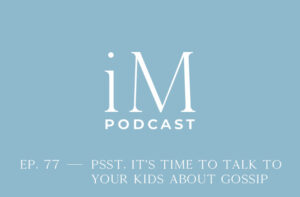“Is he suspended?” I asked my son about his classmate, and his reply was “I don’t know.” I smiled and said, “Good. That should be your response to kids at school, too.” Earlier that afternoon, an email asked all parents to remind our kids of the dangers of gossip and the rumor mill. A bad situation with one student was worsened because of chatter and whispering.
There are three positions in which kids can find themselves within a rumor mill: the spreader, the spectator, or the subject. Here are 7 tactics to help keep your kids out of it altogether.
To Avoid Being the Spreader
1. Teach your kids about the physical side effects of gossip.
There are physical dangers (other than getting beat up) associated with the rumor mill. Research shows spreading gossip significantly increases levels of oxytocin, the “warm fuzzies” hormone. It makes you feel good in the short term but can form dark pathways in your brain.
When you gossip and get that hit of oxytocin, you train your brain to look for other things to gossip about. Your brain can start to write negative stories to get that hit of oxytocin. Ask your kids if they want to fix their thoughts on what is good or what is bad.
2. Remind them to take a pause.
I was with a friend the other day, and she said, “I want to say something that isn’t very nice.” Then she paused. In the moment of silence, I wanted to hear what she was teasing, but I also hoped she would choose the higher road. She did.
Coach your kids to pause when they’re tempted to step into the rumor mill. Have them ask themselves what they’re feeling right then. Jealousy, disconnection, insecurity… Any negative emotion indicates the comment isn’t coming from a place of love or concern and shouldn’t be said.
To Avoid Being the Spectator
3. Have go-to lines for shutting down the conversation.
Most kids aren’t bullied or bullies; they’re bystanders. Same for gossip and rumors. If more rumor spectators became rumor stoppers, there would be fewer hurt feelings and ruined reputations.
It takes a tough kid to speak up for what is right. After all, it might put her in the line of fire. Simple lines like, “Hey guys, we don’t know for sure if this is the truth,” “This isn’t our business,” or “I don’t have anything to add to this conversation” can keep the rumor mill from churning.
4. Talk about finding a new friend group.
If there’s a bright side to rumors and gossip, it’s that it’s a valuable tool in teaching kids about friendship. Remind your kids that if their friends are talking about others around them, they’re probably talking about them around others, too. Help your kids get out of the spectator seat in the rumor mill by encouraging them to move to a different table at lunch or silence a group text.

To Avoid Being the Subject
5. Remind them not to feed the fire.
When kids learn fire safety, they’re taught to stop, drop, and roll. Running with fire gives the fire oxygen, which helps it grow. Help your child visualize putting out the fire by denying the rumor once and then going silent. Most bullies enjoy getting a rise out of the victim, so help your child lay low and let the rumor die. And never retaliate. If your child feels confident enough to approach the spreader directly, encourage her to speak with little emotion. “What you’re saying is untrue. Please stop.”
6. Caution your child about oversharing.
A hallmark of adolescence is connecting through vulnerability. Sharing secrets cements BFF status. But warn your kids about what they share via text and social media. If it gets into the wrong hands or a friendship goes sour, it’s easy to twist the truth and use it as ammunition.
7. Encourage your child to live in a way that leaves little room for question.
Rumors can be started about anyone for any reason, so there’s no foolproof way for a kid to protect herself from being the subject. But help your child build character qualities like honesty, kindness, and being respectful of others, and when one does go around, people will be less likely to believe it.
Has your child been sucked into the rumor mill as the spreader, spectator, or subject? What did you do?










